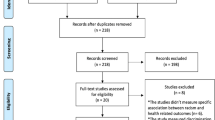Abstract
Despite increasing mental health promotion and advocacy, stigma persists and poses a significant threat to the healthy functioning at the macro and micro-sociological levels. Stigma is gradually evolving with the incorporation of broader social contexts at the micro and macro levels in which individuals, institutions and larger cultural constructs shape and influence the perception of what is different and therefore stigmatized. This theoretical paper based on literature underscores how mental health stigma discourages individuals from getting proper mental health treatment. The interface of mental illness, stigma, and mental health treatment has ethical and potentially moral implications.
Similar content being viewed by others
References
Ahmedani, B. (2011). Mental health stigma: Society, individuals, and the profession. Journal of Social Work Values Ethics, 8(2), 4
Bailey, R. K., Patel, M., Barker, N. C., Ali, S., & Jabeen, S. (2011). Major depressive disorder in the African American population. Journal of the National Medical Association, 103(7), 548–557.
Bishop, T. F., Ramsay, P. P., Casalino, L. P., Bao, Y., Pincus, H. A., & Shortell, S. M. (2016). Care management processes used less often for depression than for other chronic conditions in US primary care practices. Health Affairs, 35(3), 394–400.
Boonstra, N., Klaassen, R., Sytema, S., Marshall, M., De Haan, L., Wunderink, L., & Wiersma, D. (2012). Duration of untreated psychosis and negative symptoms: A systematic review and meta-analysis of individual patient data. Schizophrenia Research, 142, 12–19.
Bulanda, J., Bruhn, C., Johnson-Byro, T., & Zentmyer, M. (2014). Addressing mental health stigma among youth adolescents: Evaluation of a youth-led approach. Health and Social Work, 39(2), 73–80.
Clement, S., Schauman, O., Graham, T., Maggioni, F., Evans-Lacko, S., Bezborodovs, N., Morgan, C., Rüsch, N., Brown, J. S., & Thornicroft, G. (2015). What is the impact of mental health-related stigma on help-seeking? A systematic review of quantitative and qualitative studies. Psychological Medicine, 45, 11–27.
Corrigan, P. W., Morris, S. B., Michaels, P. J., Rafacz, J. D., & Rüsch, N. (2012). Challenging the public stigma of mental illness: A meta-analysis of outcome studies. Psychiatric Services, 63(10), 963–973.
Crisp, A., Gelder, M. G., Rix, S., Meltzer, H. I., & Rowlands, O. J. (2000). Stigmatization of people with mental illness. The British Journal of Psychiatry, 177(1), 4–7.
Dell’Osso, B., Glick, I. D., Baldwin, D. S., & Altamura, A. C. (2013). Can long-term outcomes be improved by shortening the duration of untreated illness in psychiatric disorders: A conceptual framework. Psychopathology, 14, 14–21.
Elkington, K., Hackler, D., McKinnon, D., Borges, C., Wright, E., & Wainberg, M. (2012). Perceived mental illness stigma among youth in psychiatric outpatient treatment. Journal of Adolescent Research, 27(2), 290–317.
Holt, R. I. G., & Peveler, R. C. (2010). Diabetes and cardiovascular risk in severe mental illness: A missed opportunity and challenge for the future. Practical Diabetes International, 27, 79–84.
Insel, T. R. (2008). Assessing the economic costs of serious mental illness. American Journal of Psychiatry, 165(6), 703–711.
Lindsey, M., & Marcell, A. (2012). We’re going through a lot of struggles that people don’t even know about: The need to understand African American males’ help seeking for mental health on multiple levels. American Journal of Men’s Health, 6(5), 354–365.
Morgan, C., Mallett, R., Hutchinson, G., & Leff, J. (2004). Negative pathways to psychiatric care and ethnicity: The bridge between social science and psychiatry. Social Science and Medicine, 58, 739–752.
Morrison, E. F., & Thornton, K. A. (1999). Influence of southern spiritual beliefs on perceptions of mental illness. Issues in Mental Health Nursing, 20(5), 443–458.
Moses, T. (2010). Being treated differently: Stigma experiences with family, peers, and school staff among adolescents with mental health disorders. Social Science & Medicine, 70(7), 985–993.
NIMH. (2016). Any mental illness (AMI) among U.S. adults. Retrieved December 2016, from http://www.nimh.nih.gov/health/statistics/prevalence/any-mental-illness-ami-among-adults.shtml.
Oliver, M. I., Pearson, N., Coe, N., & Gunnell, D. (2005). Help-seeking behavior in men and women with common mental health problems: cross-sectional study. British Journal of Psychiatry, 186, 297–301.
Pescosolido, B., Martin, E., Lang, J. K., A., & Olafsdottir, S. (2008). Rethinking theoretical approaches to stigma: A Framework Integrating normative influences on stigma (FINIS). Social Science & Medicine, 67(3), 431–440.
SAMHSA. (2015). Racial/ethnic differences in mental health service use among adults. Retrieved June 2015, from https://www.samhsa.gov/data/sites/default/files/MHServicesUseAmongAdults/MHServicesUseAmongAdults.pdf.
Sharac, J., McCrone, P., Clement, S., & Thornicroft, G. (2010). The economic impact of mental health stigma and discrimination: A systematic review. Epidemiology and Psychiatric Sciences, 19(3), 223–232.
Siebert, D. C. (2005). Help seeking for AOD misuse among social workers: Patterns, barriers, and implications. Social Work, 50(1), 65–75.
Taub, S., Morin, K., Goldrich, M. S., Ray, P., & Benjamin, R. (2006). Physician health and wellness. Occupational Medicine, 56(2), 77–82.
US Department of Health and Human Services, US Department of Education, & US Department of Justice. (2000). Report of the Surgeon General’s conference on children’s mental health: A national action agenda. Washington, DC: US Department of Health and Human Services. Retrieved November 2015, from http://www.ncbi.nlm.nih.gov/books/NBK44233/pdf/TOC.pdf.
Volmer, D., Mäesalu, M., Bell, J. S. (2008). Pharmacy students’ attitudes toward and professional interactions with people with mental disorders. International Journal of Social Psychiatry, 54(5), 402–413.
Wallace, J. (2010). Mental health and stigma in the medical profession. Health, 16(1), 3–18.
World Health Organization (WHO). (2001). The world health report 2001. Mental health: New understanding, new hope. Geneva, Switzerland: WHO. http://www.who.int/whr/2001/en/whr01_en.pdf?ua=1. Accessed Dec 2015.
Author information
Authors and Affiliations
Corresponding author
Ethics declarations
Conflict of interest
We have no conflict of interest to disclose and or acknowledge.
Rights and permissions
About this article
Cite this article
Holder, S.M., Peterson, E.R., Stephens, R. et al. Stigma in Mental Health at the Macro and Micro Levels: Implications for Mental Health Consumers and Professionals. Community Ment Health J 55, 369–374 (2019). https://doi.org/10.1007/s10597-018-0308-y
Received:
Accepted:
Published:
Issue Date:
DOI: https://doi.org/10.1007/s10597-018-0308-y




